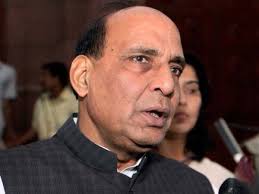New Delhi, Mar 4: Government today said it would not allow broadcast of a controversial documentary featuring a Nirbhaya gangrape convict as members of Parliament, cutting across party lines, expressed outrage over the incident.
 Maintaining that it would not allow commercial use of such incidents, Home Minister Rajnath Singh said he was "stunned" as to how permission was granted for the convict's interview inside the Tihar Jail here in the first place.
Maintaining that it would not allow commercial use of such incidents, Home Minister Rajnath Singh said he was "stunned" as to how permission was granted for the convict's interview inside the Tihar Jail here in the first place.
Making a statement in both Houses, Singh assured Parliament that Government would order a probe into it to fix responsibility for the shooting of this controversial documentary film of Nirbhya gang-rape convict.
He said he has asked Information and Broadcasting Ministry to look for ways to ban its broadcast abroad and would review the existing provisions for allowing such shoots inside prisons to ensure that such incidents do not recur.
The Home Minister's statement in both Rajya Sabha and Lok Sabha came after Opposition protests in the Upper House, including a walkout by Samajwadi Party members, and vociferous protests in the Lower House with members demanding action over the December 16, 2012 gangrape convict being allowed to give an outrageous interview from inside the high- security prison here.
Singh informed both the Houses that the No Objection Certficiate to shoot the documentary was given by his Ministry in July 2013.
Subsequently the jail authorities gave the permission with any prior conditions like the film-makers would have to show the unedited version of the shoot or take prior approval for telecasting or publishing any part of the shoot.
Noting that the conditions were violated, he said, "under no circumstances, this documentary will be allowed to be broadcast... Government has taken necessary action and secured an order restraining the telecast of the film.
"I was stunned and deeply hurt by this when I came to know about it yesterday. I spoke to the authorities and made sure that all steps are taken to stop the broadcast," he said.
The govermenmt strongly condemns it and will "not allow any organisation to leverage such an incident for commercial use".





Comments
Add new comment